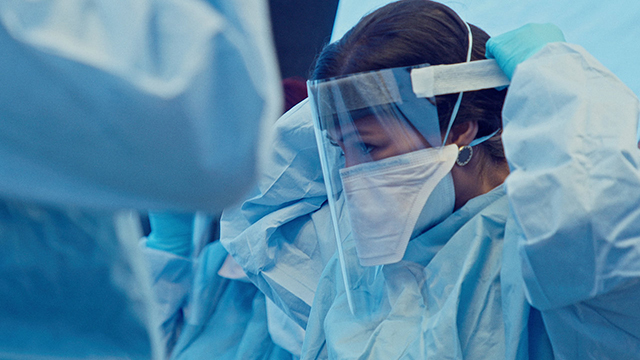
Overcrowded hospitals, exhausted doctors, misinformation, white masks and hazmat suits.
These scenes, along with the constant risk of losing a family member to the flu are commonplace in a hospital in India working at full capacity during flu season and they are commonplace in the Democratic Republic of Congo where the World Health Organisation workers are desperately trying to contain the spread of the deadly Ebola virus.
When Netflix made “Pandemic” they were highlighting a faraway problem, a problem for future generations. The fact that a family member could pass away in isolation was an unimaginable scenario in the Western World at the time of its release. Yet, the white crosses representing graves bear a striking resemblance to a clip we have all become accustomed to- a convoy of Italian military trucks carrying citizens towards a crematorium.
It is the series that has pushed “The Office” out of the top ten most watched TV series, a warning from experts that this has become our new reality. The episodes are split into chapters. These are chapters of remarkable stories highlighting many topical moral issues and bringing our attention to the frontline heroes who have been using the words “pandemic” and “quarantine” long before antibacterial gel became gold dust on Irish shelves, before the word “COVID-19” possessed the ability to strike fear into young and old alike.
The docu-series traveled across the globe like the breaking news bulletins that have now become part of our daily routines. We are constantly reminded of the devastating impact of the influenza outbreak of 1918, a time before flying between continents was a common job requirement.
The human life stories and moral issues brought to the forefront of this series are what makes it remarkable. The woman vaccinating asylum seekers, often having to prioritise pregnant women and children due to a lack of support from the state. The highs and lows of getting a vaccine that works, to human trials without the backing of a massive Pharma company. The doctors that sleep in small state hospitals that constantly face the threat of closure. These are the stories of the fathers that cannot turn up to their son’s graduation, the mothers that answer emails in the dead of night.
We are given an insight into a world that has only now become important to us- the world of preparing for the worst, the world of scientists that screen bats in caves for diseases that could become the pandemic that changes everything. We also hear from those that choose not to vaccinate their children for moral and religious reasons, even out of fear.
Watching this series at the moment might seem to go against the World Health Organisation’s “Mental Health and Psychosocial Considerations during COVID-19” guidelines. Yet, there is a sense of comfort to be gained from knowing that there are people constantly working to protect us. Whether they are inspired by a god, the circumstances of their upbringing or simply a need to help humanity the stars of this docu-series constantly tell us that money is not their motivator.
We do not see these people on a regular basis. We do not hear of the Ebola deaths in the Democratic Republic of Congo. We do not hear about the vaccine trials on pigs in Guatemala or the miracle doctor in India hailed to be sent by the gods.
Right now, there are voluntary doctors giving vaccines to those that have crossed perilous international borders, there are New York doctors answering phone calls as their significant other sleeps and there are eager graduates working towards a cure for the pandemic that stopped life in its tracks.
Róisín Cullen
Image Credit: Netflix



